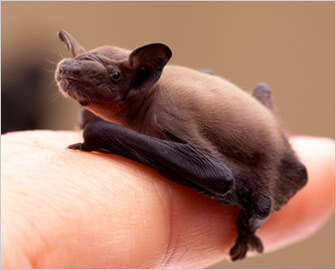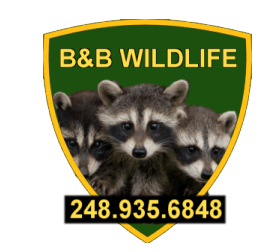Bats are Essential to our Environment
Bats are protected and are on the endangered species list
Bats have a voracious appetite for troublesome insects.
Bats Bats Bats – Information on Bats – Oakland County Michigan MI
Bats in Your House or Attic?
B&B Wildlife Removal Services understands the importance of bats to our environment. We also understand that you don’t want them living in your home or attic. They then become a harmful nuisance and health hazard especially due to the guana (feces). They also create a great deal of damage to your home. We humanely trap the bats and relocate them to a safe place, therefore protecting our environment and the species while ridding your home of the hazards bats can cause.
 Interesting Facts on Bats and Their Importance to Our Environment:
Interesting Facts on Bats and Their Importance to Our Environment:
- Bats maintain our natural world by hunting insects, pollinating plants and scattering seeds. And they are in danger.
- A single little brown bat can catch 600 Mosquitoes in just one hour.
- A colony of just 150 big brown bats can aid farmers by eating up to 18 million or more rootworms each summer. This saves crops from damage, and makes more food available at the market.
- Bats are considered a protected species and it’s against the law to keep bats. Bats are not pets and cannot be kept as such.
Myths About Bats – True or False?
- ARE BATS BLIND? No, bats are not blind and many can see very well. Insect-eating bats depend on sound and very good hearing to find food and to get around in the dark.
- DO BATS GET CAUGHT IN YOUR HAIR? If bats can find tiny insects in total darkness, would they get tangled up in your hair? No! They are much too smart to fly into people.
- BATS ARE FLYING MICE, RIGHT? No, while both bats and mice are mammals, bats are not rodents and are more closely related to primates and people. Besides…mice can’t fly!
- ARE BATS DIRTY AND DO THEY ALL CARRY RABIES? No, bats are very clean and groom themselves just like cats. Bats can get rabies, like all mammals, but few ever do. Remember, bats are wild animals. You have nothing to fear if you NEVER touch a bat.
Bats and Rabies:
You cannot get rabies from just seeing a bat, from simply being in a room with a bat or from contact with bat guano (feces), urine or blood. And the vast majority of bats do not have rabies. In the United States from 1995 through 2009, an average of two people per year have died of rabies associated with bats. A bat that can be easily approached by humans is much more likely than other bats to be sick, and it may bite if handled. Do not touch or handle a bat or any other wild animal and there will be little chance of being bitten. Teach children to never handle any wild animal.
Threats to Bats:
- Wind turbines: The lungs of bats are just like mammal lungs, and they are more sensitive to sudden air pressure changes in their immediate vicinity such as wind turbines, and are more liable to rupture them. Bats suffer a higher death rate than birds in the neighborhood of wind turbines. In addition, it has been suggested that bats are attracted to these structures, perhaps seeking roosts, and thereby increasing the death rate.
-
- White-Nose Syndrome: White-nose Syndrome (WNS) is a new disease that is causing a huge decline of North American wildlife in the past century. It has killed more than one million bats in less than four years and threatens to devastate bat populations across the continent. Nearly 100 percent of bats have died at some sites.Which bats are dying? Six bat species have been affected by WNS so far: little brown myotis (Myotis lucifugus), big brown bats (Eptesicus fuscus), tri-colored bats (Perimyotis subflavus), northern myotis (Myotis septentrionalis), eastern small-footed myotis (Myotis leibii), and the endangered Indiana myotis (Myotis sodalis). If current infection and mortality patterns continue, 25 species of hibernating bats in the United States could decline, and WNS could threaten some previously common species with extinction. Why do bat die-offs from WNS matter? The number of insects consumed annually by one million bats, the estimated number of WNS fatalities to date, is staggering: just under 700,000 tons. These bats have extraordinary value in maintaining the health of nearly all terrestrial and aquatic ecosystems. And since many of the insects eaten by bats are crop pests, losing large numbers of bats will likely have expensive impacts on agriculture.How soon will bat populations recover? Bats are long-lived but slow-reproducing mammals. Bats of most species have an average lifespan of more than 20 years and give birth to only one pup each year. Where WNS has killed large numbers, it is unlikely bat populations will recover to pre-WNS levels in our lifetime – if ever.
Mortality rates approaching 100 percent are reported at some sites. White-nose Syndrome has now moved into Canada, West Virginia, Virginia, Tennessee and Maryland. It threatens some of the largest hibernation caves for endangered Indiana myotis, gray myotis, and Virginia big-eared bats. Ultimately, bats across North America are at imminent risk. Bats eat vast numbers of insects, thus protecting both crops and reducing human disease transmission by these bugs. Less bats = more insects = potentially more disease.
- White-Nose Syndrome: White-nose Syndrome (WNS) is a new disease that is causing a huge decline of North American wildlife in the past century. It has killed more than one million bats in less than four years and threatens to devastate bat populations across the continent. Nearly 100 percent of bats have died at some sites.Which bats are dying? Six bat species have been affected by WNS so far: little brown myotis (Myotis lucifugus), big brown bats (Eptesicus fuscus), tri-colored bats (Perimyotis subflavus), northern myotis (Myotis septentrionalis), eastern small-footed myotis (Myotis leibii), and the endangered Indiana myotis (Myotis sodalis). If current infection and mortality patterns continue, 25 species of hibernating bats in the United States could decline, and WNS could threaten some previously common species with extinction. Why do bat die-offs from WNS matter? The number of insects consumed annually by one million bats, the estimated number of WNS fatalities to date, is staggering: just under 700,000 tons. These bats have extraordinary value in maintaining the health of nearly all terrestrial and aquatic ecosystems. And since many of the insects eaten by bats are crop pests, losing large numbers of bats will likely have expensive impacts on agriculture.How soon will bat populations recover? Bats are long-lived but slow-reproducing mammals. Bats of most species have an average lifespan of more than 20 years and give birth to only one pup each year. Where WNS has killed large numbers, it is unlikely bat populations will recover to pre-WNS levels in our lifetime – if ever.
- Human Activities: Human activities have by far the greatest influence on bat populations. Deforestation is killing off many thousands of individual bats and, in some cases, wiping out entire species. Even when some trees are left, they may be exposed to storms and blow over. The soil is soon washed away and the plants that sustain bats by providing insects or fruit can no longer grow. Roost sites are being chainsawed away.It is common for people to have a bat in their house and want to use poisons or other means to kill the bats. THIS IS ILLEGAL and very dangerous. Bats are protected by the endangered species list. If you have a bat in your home or attic, please call us. We will remove the bat humanely and seal the points of entry.
Call B&B Wildlife Removal Services TODAY!
248-935-6848


